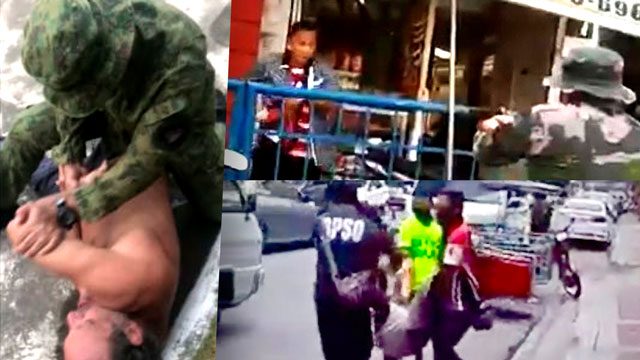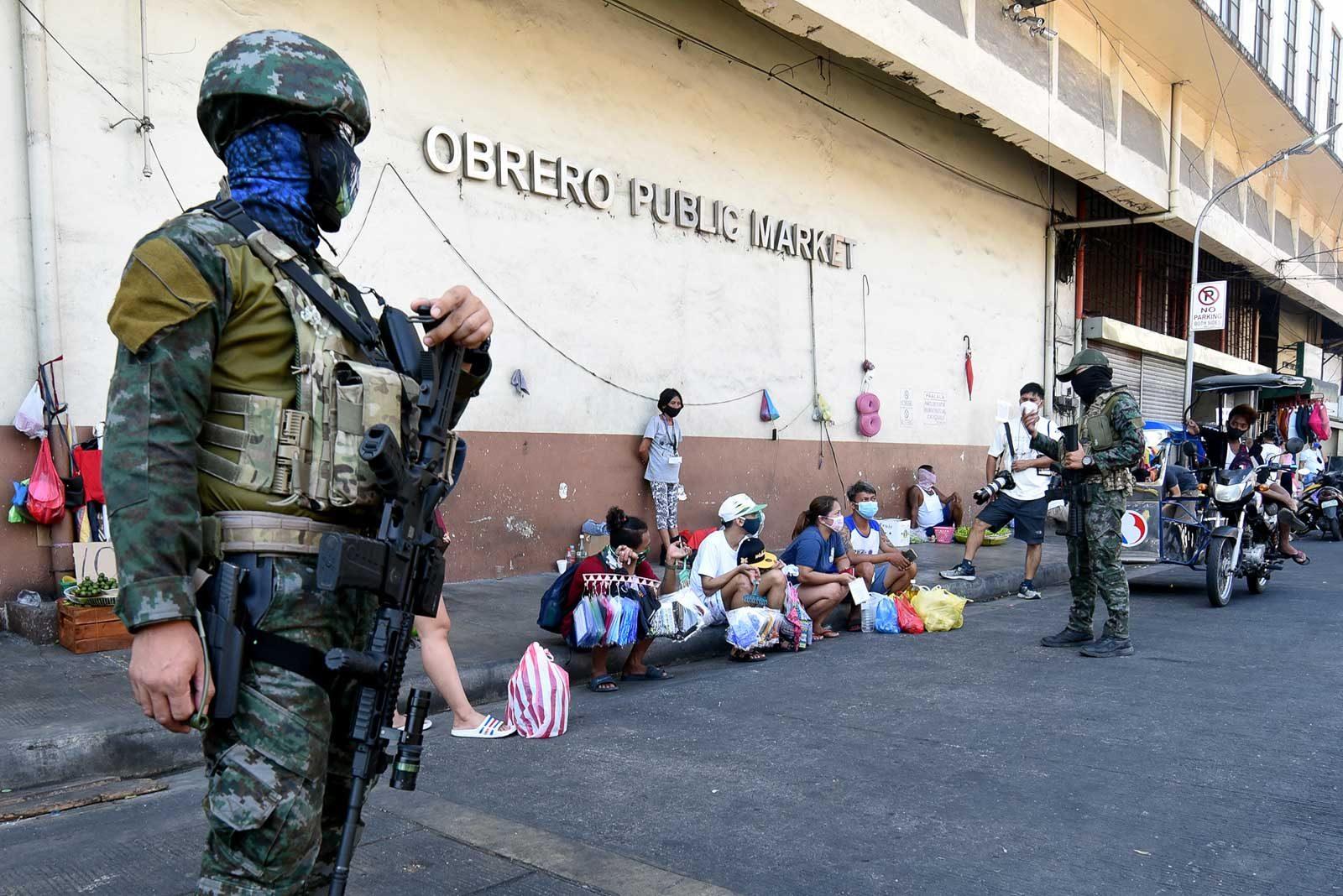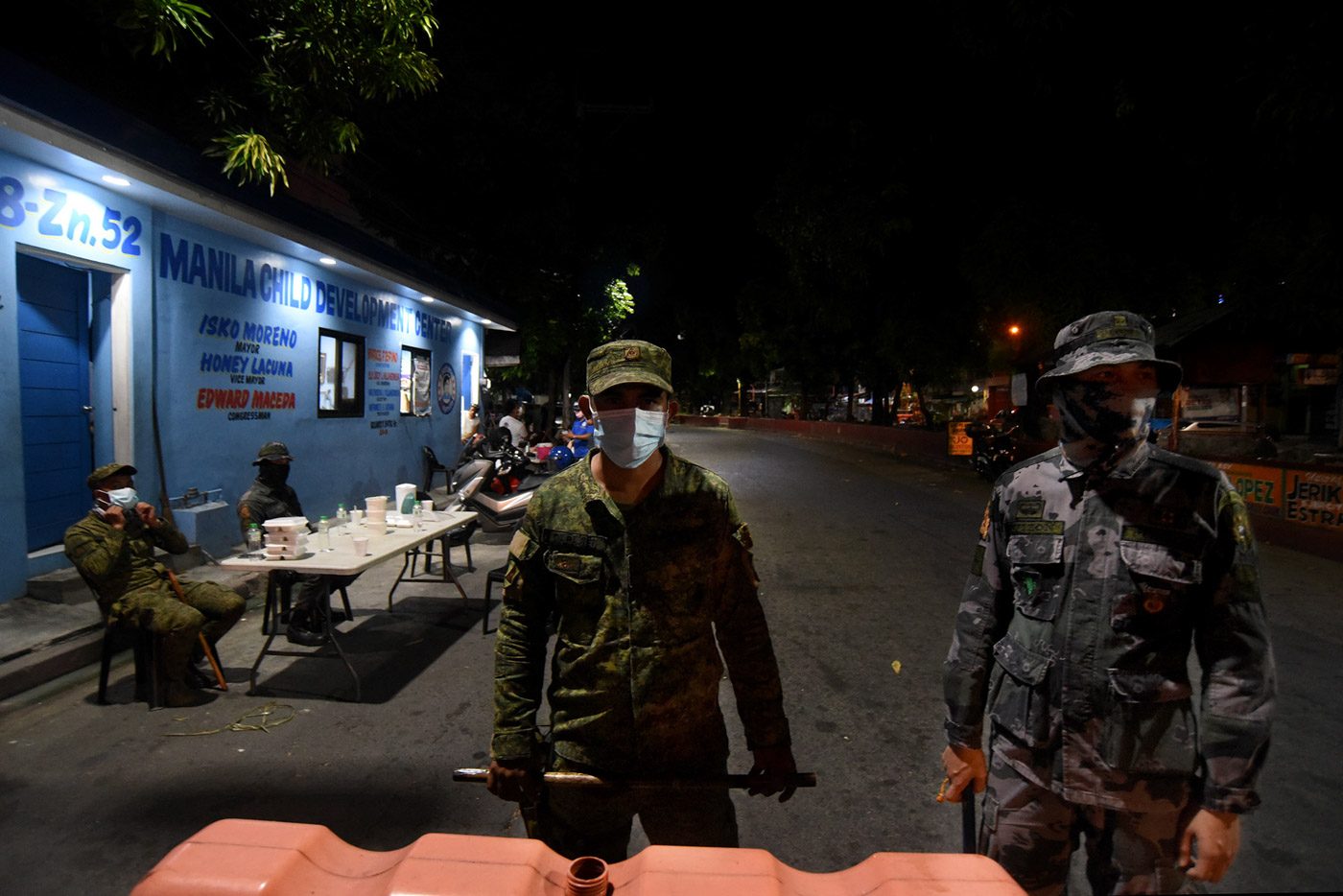SUMMARY
This is AI generated summarization, which may have errors. For context, always refer to the full article.

AT A GLANCE
- The strict implementation of quarantine guidelines has led to reports of police abuse and brutality.
- At least 38,817 people have been arrested for allegedly violating quarantine rules.
- The Commission on Human Rights (CHR) has received 368 requests for assistance and complaints, coming mostly from the National Capital Region, Central Luzon, and Calabarzon.
- The Philippine National Police applies the same rules of engagement in the pandemic as in its operations, primarily the anti-drug campaign.
- Human rights groups point out that the current situation is reminiscent of the government’s violent anti-illegal drug campaign
MANILA, Philippines – Noli* used to consider himself lucky for still finding a way to earn a living under the enhanced community quarantine.
He earned a few hundreds selling fish after a contact tapped him as a reseller in his community. It was lower than what Noli used to get in the construction site, yes, but it beats going to bed hungry at night.
This gave him and his wife, Josie*, a routine during the dragging weeks since President Rodrigo Duterte placed Luzon and neighboring areas under lockdown.
They both woke up early, with Josie preparing breakfast while Noli readied himself while waiting for the day’s chestful of fish to be delivered. He usually waited right in front of their house, a few feet away from the front door.
On April 5, just like any other day, the couple proceeded with their routine. Little did they know that this time, their lives would be changed.
Noli was arrested by alleged police a little past 9 am that day. He was told he was not wearing a mask and was considered a tambay, a loiterer. Josie saw them forcefully grab her husband, a frail man in his late 30s, by his arm.“Nakiusap naman na walang ginagawa iyong asawa ko, hinihintay lang iyong paninda niya, ilang hakbang lang iyong mula sa pintuan namin,” she told Rappler. “Pero hindi pinakinggan, huhulihin pa rin daw nila.”
(I was begging them that he wasn’t doing anything wrong, he was just waiting for the delivery of fish that he was going to sell a few steps from our house. But they didn’t listen, they said they would still arrest him.) Josie went to the detention place the following day to beg for his release. But no amount of begging sufficed. Instead, she recalled being told the key to her husband’s freedom was P2,000.Josie knew they didn’t have that money. Determined to help Noli, she borrowed from a “5-6” lender, even if she had no idea how to repay the loan.
“Kumagat ako kasi sa kailangan na kailangan ko po mailabas ang asawa ko kasi iyong takot namin,” she said. “Natanim sa isip ko na baka mangyari sa kanya ‘yung mga nangyayari sa iba.”
(I had no choice because I really needed to get my husband out of that place because we were afraid. It was already planted in my head that what happened to others could happen to them.)
Josie had every reason to worry for Noli’s welfare inside. She saw in the news what happened to those detained, be it in her own city or in other local government units. On April 9, her husband was finally released.
Noli spent a total of 4 days detained, an ordeal that greatly affected him, according to his wife.
She said he’s now traumatized and refuses to go out. He ceased selling fish, further decreasing the family’s budget for necessities during the lockdown.
The sound of heavy steps outside their home rattles Noli, Josie said. The trips to the community water station become tense, with Noli constantly looking over his shoulder for any sign of the police.
“Nakakapanghina, nakakaawa, mapapaisip ka bakit sila ganyan?” Josie said. “Puwede naman nila tiketan lang, bakit kailangang hulihin? Hindi naman sila kriminal, naghahanap-buhay lang naman.”(It has left us drained, pitiful, we can’t help but wonder why they are that way. They could have just issued violators a ticket instead of detaining them. They are not criminals. They are just looking for a way to earn a living.)
All vulnerable
Incidents of abuse like what Noli experienced cuts across class lines, as the PNP and the government have vowed a stringent enforcement of lockdown rules in all communities.
On April 20, 4 cops stormed the high-end Pacific Plaza Towers (PPT) condominium complex in Bonifacio Global City, Taguig City, threatening guards with arrest if they were not allowed in, and then accosting residents who did not wear face masks and allegedly did not practice physical distancing in common areas.
They carried guns without warrants.
Two days later, a Quezon City cop shot dead a schizophrenic and traumatized former soldier, Winston Ragos, for allegedly threatening the life of cops by attempting to pull something inside his sling bag. Cops believe it was a gun, but witnesses and relatives said it was just a water bottle.
On April 26, a Spanish citizen staying in Makati City, Javier Salvador Parra, was tackled to the ground by a cop arresting him after his house help did not wear a face mask while watering their house plants.
Just a day later, Quezon City local officials mauled and dragged a fish vendor named Michael Rubuia for failing to wear a face mask and not bringing a quarantine pass while selling outdoors.
Based on the events so far, the poor are still most vulnerable to overzealous cops.
The incidents in the upscale areas were both the result of local officials calling the cops in. In Taguig, Mayor Lino Cayetano called the police to enter PPT. In Makati, the barangay captain, Rosana Hwang, asked cops to patrol inside Dasmariñas village. The victims in less developed areas were all, in the language of cops, “chanced upon” in checkpoints and patrols. The incidents are also not unique to the coronavirus epicenter Metro Manila, as there have been reported cases of abuse in the provinces, too. In Mexico, Pampanga, 3 LGBTQ+ people were ordered by a barangay captain to kiss each other and perform a “sexy” dance in front of a minor on April 5, as a way of punishing them for violating curfew.Intensifying the shame, the barangay captain, Christopher Bombing Punzalan, broadcast the punishment on his Facebook account and read out their names to viewers. There is no law that prescribes any of the punishments Punzalan gave the alleged violators.
On April 19, former Anakpawis representative Ariel Casilao and several others who were on their way to deliver relief goods were detained in Norzagaray, Bulacan on their way to deliver relief goods.
They said cops did not explain why they were arrested, and why their donations were taken and turned over to local officials.
Numbers recorded by the Joint Task Force COVID Shield, the inter-agency law enforcement task force implementing quarantine rules, has recorded over 150,000 incidents of people violating lockdown rules.
Not all have been arrested. Most of the incidents led to enforcers warning violators — a total of 104,073. Some 9,209 have been fined, while 38,817 have been arrested.
Graphing the day-to-day data shows that most violations were recorded at the onset of the lockdown: 8,205 violations were recorded on March 17. Of that number 1,163 were arrested. Majority were still only warned, as they comprised 6,657 incidents.
On March 28, arrests shot up to 2,650, surpassing warnings that dropped to 2,153 from 3,132 the previous day.The spike in arrests came 3 days after President Rodrigo Duterte signed the Bayanihan to Heal as One Act of 2020, which became a new national basis for filing cases against violators.
Prior to its signing, cops had to wait for local government units to pass ordinances that penalize quarantine violators before they could make arrests.Since then, the number of violators recorded rose and fell between 2,200 to 3,300 a day. The last peak of the recorded violators reached 4,130 on April 15.
On April 24, warnings dropped to zero. The steep decline began on April 22, a day after the PNP national headquarters said police would no longer issue warnings. In the same days, arrests rose slightly from 778 to 1,098.
Police have done more arrests than issued warnings and collected fines ever since.
With such rising apprehensions and arrests, victims of abuse in the hands of police and military have turned to organizations such as the Commission on Human Rights (CHR) for help.
Since the lockdown began on March 15, the CHR has been on the receiving end of complaints through its hotlines, emails, and social media accounts.
As of April 29, the CHR has received 368 requests for assistance and complaints, coming mostly from the National Capital Region, Central Luzon, and Calabarzon.
Its investigators and lawyers are still deployed to the field to probe into these complaints, majority of which are related to “alleged torture or cruel, inhuman, and degrading treatment and punishment; accounts of illegal arrests and/or detentions, as well as requests for assistance with regards relief goods or the government emergency subsidy.”
“The number of violations arising from policies related to the lockdown may be attributed to the lack of or unclear guidelines to implement them as well as overzealousness in applying the quarantine,” CHR said.
Human rights sidelined
Several groups have called out the government for its lack of a human rights-based approach in addressing the pandemic. On the other hand, there are existing discourses by the administration on how much authority can be exercised during a crisis.
This is where the challenge arises from, according to CHR, when the concept of human rights continues to be “largely misunderstood and underappreciated” by those in power.
“The way human rights have been regarded, or disregarded, has an effect on how we see and treat people and, in a way, shapes policies and their implementation,” the commission said.Citizens should follow and respect rules set during the lockdown, CHR said, but violators should not be treated inhumanely. Law enforcers should “equally exhibit respect and practice maximum tolerance.”
But can a public health emergency erase one’s rights? Some necessary measures may lead to certain restrictions, but the United Nations said that these should meet the requirements of “legality, necessity and proportionality, and be non-discriminatory.”
Specifically, UN rights chief Michelle Bachelet warned authorities that emergency powers should be used only to address the pandemic “nothing more, nothing less.” Going beyond may be disastrous.
Philippine Alliance of Human Rights Advocates (PAHRA) chairperson Nymia Simbulan, meanwhile, believes that the role of the military and police in the coronavirus pandemic should not have been this big.
The policies and public statements of the administration, including authorities turning a blind eye to human rights violations, are reminiscent of the government’s violent anti-illegal drug campaign.
“The state’s handling of this public health crisis did not veer away from the way it handled the illegal drug problem in the country,” Simbulan said. “It’s actually a duplication or a replication of the very violent strategy of the state.”
These factors, she said, only showed the government’s disregard of a human rights-based approach to the coronavirus pandemic, something that many groups have urged since the beginning of the crisis.
Take for example the constant use of the rhetoric of war, according to Simbulan, which only justifies the blatant show of force in the form of deployment of police and military in areas where they are not normally seen.
“They’re making themselves highly visible to the people to the point that it’s already normal to be seeing men in uniform with high-powered guns roaming around the community,” Simbulan said. “It reinforces the role of state violence as a key tool and instrument in addressing the problem,” she added.
The value of upholding human rights should not be lost on the government, CHR said, as authorities should always remember that “the protection of our human rights is the very reason why we fight against the COVID-19.”

Drug war blueprint?
Under quarantine, the Philippine National Police uses the same operational procedures as when it deals with criminals, but with a different goal in mind.
“The purpose of the quarantine is to restrict movement of the people who could be carriers of the virus,” Joint Task Force COVID Shield chief Police Lieutenant General Guillermo Eleazar told Rappler in an interview on April 14.
They continue to follow the rules imposed by their operational manual that they have been using in the controversial anti-drug campaign Oplan Double Barrel and checkpoint operations.
They follow the same rules of engagement: that cops should only apply “necessary and reasonable force to overcome resistance put up by the offender; subdue the clear and imminent danger posed by him; or to justify the force/act under the principles of self-defense, defense of relative, or defense of stranger.”This has taken on a new meaning under the Duterte administration, specifically since the beginning of the anti-drug campaign, where cops have been advised to “neutralize” suspects who threaten their lives. This could mean disabling the suspects, or in less ideal situations, killing them.
Duterte took this further by ordering the police to “shoot dead” unruly violators, particularly those who threaten a cop’s life. Three weeks later, Winston Ragos was killed in Quezon City.
The issue of trespassing without warrants has also repeatedly cropped up in the enforcement of quarantine rules in the Dasmariñas Village and PPT incidents.
No less than retired Supreme Court associate justice Antonio Carpio said the police’s actions possibly violated the right to be secure in one’s home. Police argue that they were invited into PPT and Dasmariñas Village.
The arguments on the violation of domicile harks back to the same legal arguments undertaken by the Supreme Court in 2017 on whether cops can just knock on the doors of people they suspect of committing crime and then investigate.
The scrutiny of the drug war has led to a renewal of policy in the drug campaign, including the requirement of human rights officers in operations to prevent incidents of abuse. This development has not been replicated for quarantine law enforcement.
For law enforcement under quarantine, the police follow the guidelines of the Inter-Agency Task Force (IATF), which has been criticized for giving vague, piecemeal guidelines, and local government units that pass their own ordinances to match their own pandemic problems.
A source told Rappler that the PNP has submitted clearer “protocols” for policemen for the IATF to pass as a resolution.
Eleazar, meanwhile, said they have no problem with the set-up as they only follow the policies of the national government, and local cops should know what their local officials have passed into law in their jurisdictions.
Changed lives
The human rights violations reported during the lockdown, and the possible lack of accountability as warned by groups, stem from a culture of impunity that has dominated the country since the violent drug war began in 2016.
The police force roaming the streets and looking over citizens in different local government units, after all, are the same ones at the helm of Duterte’s flagship program that has taken thousands of lives.They, too, are changing a lot of lives in the pandemic.
It’s been almost a month since the unfortunate incident involving cops and Josie’s husband Noli. Their lives, already upended by the coronavirus pandemic, faces renewed hardship.
Josie, taking over the reins in the household, now goes out every morning to find any chance of earning money to put food on their table.But what used to be straightforward travel to and from their home has become more complicated, with Josie going through alleys just to avoid checkpoints. She said she’d rather walk a longer distance instead of passing by police or even village watchmen.
The sight of them transports Josie back to one month ago, she said, haunted by the shouts of Noli, the stern voices of the men who arrested him, and her own frantic cries. – Rappler.com *Names of interviewees have been changed for their protection TOP PHOTO: ON ALERT. A police vehicle is stationed outside the Blumentritt Market on April 21, 2020. Photo by Angie de Silva/RapplerAdd a comment
How does this make you feel?
There are no comments yet. Add your comment to start the conversation.